HLT54115 APN105 Assessment 1B: Mrs. Hong's Palliative Care Case Study
VerifiedAdded on 2023/01/10
|23
|4243
|78
Homework Assignment
AI Summary
This document presents a student's response template for Assessment 1B in the APN105 Applying Nursing Practice (A) course, focusing on a case study of Mrs. Hong, a 70-year-old woman receiving palliative care in a residential facility. The assessment addresses holistic care, including providing moral support, addressing communication challenges due to dementia, catering to dietary preferences, and managing hearing impairments. It explores the use of an advanced care directive, the Enrolled Nurse's scope of practice, and physiological changes in dying clients. The response also identifies members of the multidisciplinary team and their roles in providing holistic care. The assignment emphasizes the importance of cultural sensitivity, values, beliefs, and attitudes towards death and dying in providing comprehensive patient care. The document is structured around answering specific questions related to the case scenario, demonstrating an understanding of palliative care principles and nursing practice standards.
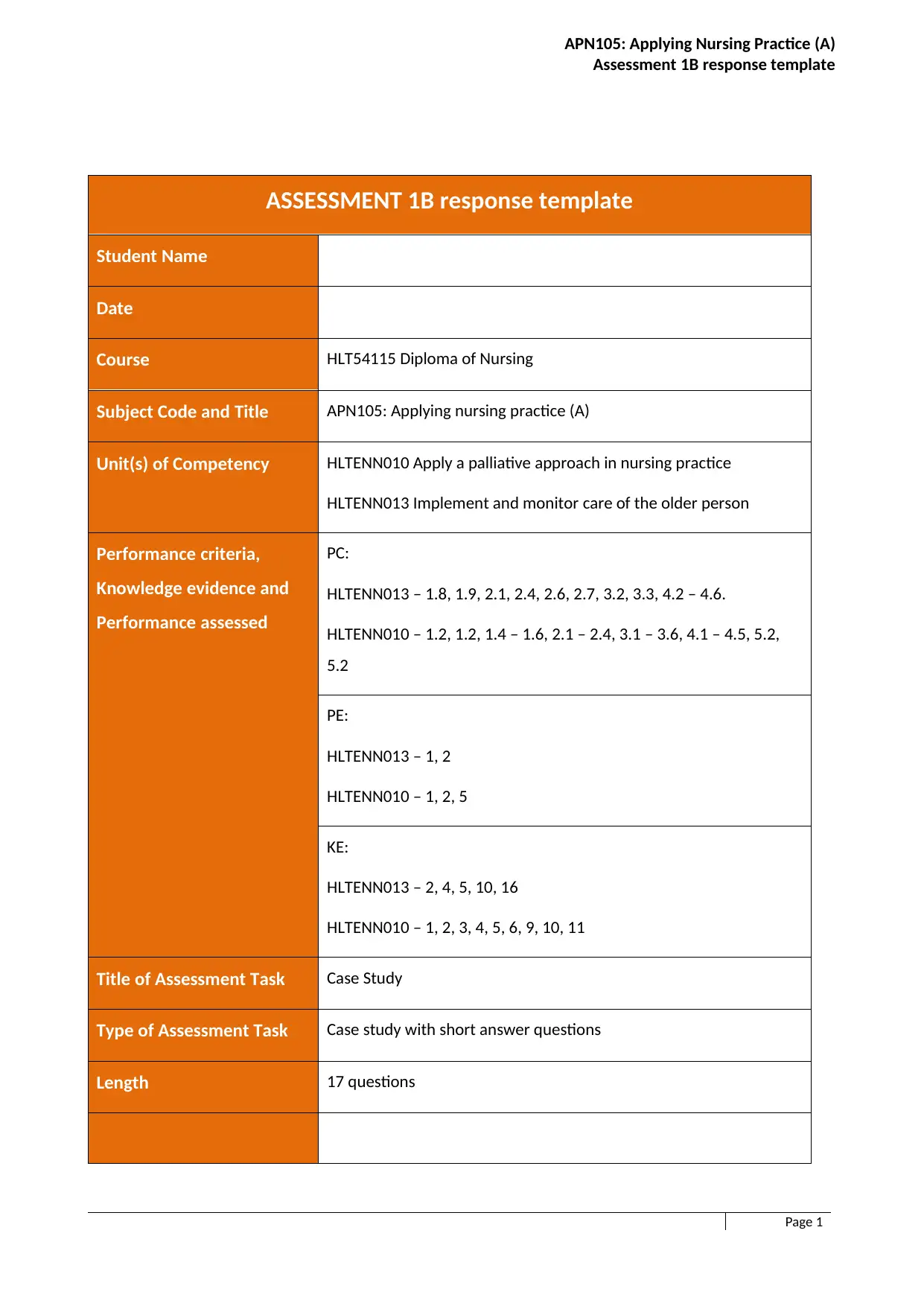
APN105: Applying Nursing Practice (A)
Assessment 1B response template
ASSESSMENT 1B response template
Student Name
Date
Course HLT54115 Diploma of Nursing
Subject Code and Title APN105: Applying nursing practice (A)
Unit(s) of Competency HLTENN010 Apply a palliative approach in nursing practice
HLTENN013 Implement and monitor care of the older person
Performance criteria,
Knowledge evidence and
Performance assessed
PC:
HLTENN013 – 1.8, 1.9, 2.1, 2.4, 2.6, 2.7, 3.2, 3.3, 4.2 – 4.6.
HLTENN010 – 1.2, 1.2, 1.4 – 1.6, 2.1 – 2.4, 3.1 – 3.6, 4.1 – 4.5, 5.2,
5.2
PE:
HLTENN013 – 1, 2
HLTENN010 – 1, 2, 5
KE:
HLTENN013 – 2, 4, 5, 10, 16
HLTENN010 – 1, 2, 3, 4, 5, 6, 9, 10, 11
Title of Assessment Task Case Study
Type of Assessment Task Case study with short answer questions
Length 17 questions
Page 1
Assessment 1B response template
ASSESSMENT 1B response template
Student Name
Date
Course HLT54115 Diploma of Nursing
Subject Code and Title APN105: Applying nursing practice (A)
Unit(s) of Competency HLTENN010 Apply a palliative approach in nursing practice
HLTENN013 Implement and monitor care of the older person
Performance criteria,
Knowledge evidence and
Performance assessed
PC:
HLTENN013 – 1.8, 1.9, 2.1, 2.4, 2.6, 2.7, 3.2, 3.3, 4.2 – 4.6.
HLTENN010 – 1.2, 1.2, 1.4 – 1.6, 2.1 – 2.4, 3.1 – 3.6, 4.1 – 4.5, 5.2,
5.2
PE:
HLTENN013 – 1, 2
HLTENN010 – 1, 2, 5
KE:
HLTENN013 – 2, 4, 5, 10, 16
HLTENN010 – 1, 2, 3, 4, 5, 6, 9, 10, 11
Title of Assessment Task Case Study
Type of Assessment Task Case study with short answer questions
Length 17 questions
Page 1
Paraphrase This Document
Need a fresh take? Get an instant paraphrase of this document with our AI Paraphraser

APN105: Applying Nursing Practice (A)
Assessment 1B response template
Page 2
Assessment 1B response template
Page 2
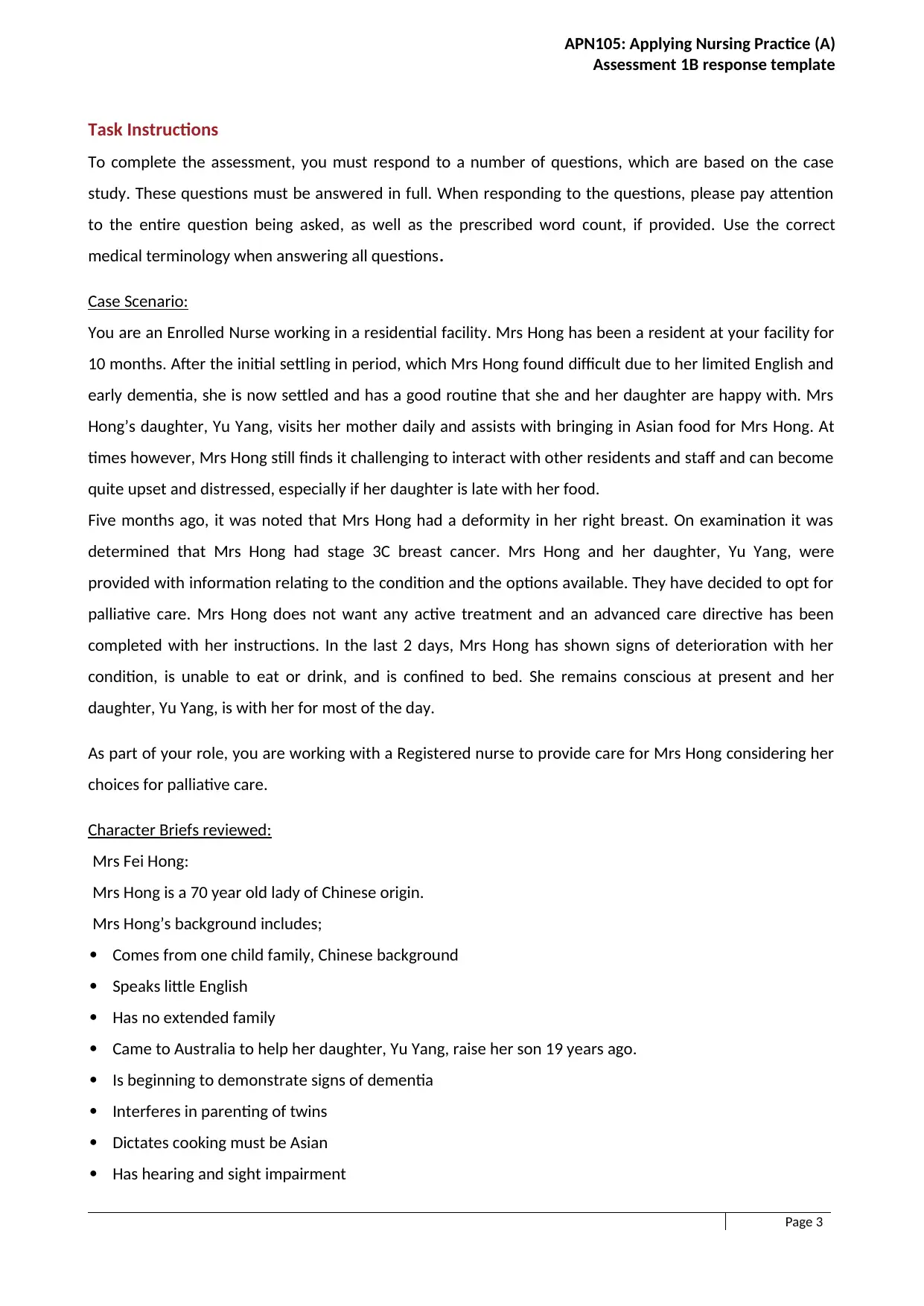
APN105: Applying Nursing Practice (A)
Assessment 1B response template
Task Instructions
To complete the assessment, you must respond to a number of questions, which are based on the case
study. These questions must be answered in full. When responding to the questions, please pay attention
to the entire question being asked, as well as the prescribed word count, if provided. Use the correct
medical terminology when answering all questions.
Case Scenario:
You are an Enrolled Nurse working in a residential facility. Mrs Hong has been a resident at your facility for
10 months. After the initial settling in period, which Mrs Hong found difficult due to her limited English and
early dementia, she is now settled and has a good routine that she and her daughter are happy with. Mrs
Hong’s daughter, Yu Yang, visits her mother daily and assists with bringing in Asian food for Mrs Hong. At
times however, Mrs Hong still finds it challenging to interact with other residents and staff and can become
quite upset and distressed, especially if her daughter is late with her food.
Five months ago, it was noted that Mrs Hong had a deformity in her right breast. On examination it was
determined that Mrs Hong had stage 3C breast cancer. Mrs Hong and her daughter, Yu Yang, were
provided with information relating to the condition and the options available. They have decided to opt for
palliative care. Mrs Hong does not want any active treatment and an advanced care directive has been
completed with her instructions. In the last 2 days, Mrs Hong has shown signs of deterioration with her
condition, is unable to eat or drink, and is confined to bed. She remains conscious at present and her
daughter, Yu Yang, is with her for most of the day.
As part of your role, you are working with a Registered nurse to provide care for Mrs Hong considering her
choices for palliative care.
Character Briefs reviewed:
Mrs Fei Hong:
Mrs Hong is a 70 year old lady of Chinese origin.
Mrs Hong’s background includes;
Comes from one child family, Chinese background
Speaks little English
Has no extended family
Came to Australia to help her daughter, Yu Yang, raise her son 19 years ago.
Is beginning to demonstrate signs of dementia
Interferes in parenting of twins
Dictates cooking must be Asian
Has hearing and sight impairment
Page 3
Assessment 1B response template
Task Instructions
To complete the assessment, you must respond to a number of questions, which are based on the case
study. These questions must be answered in full. When responding to the questions, please pay attention
to the entire question being asked, as well as the prescribed word count, if provided. Use the correct
medical terminology when answering all questions.
Case Scenario:
You are an Enrolled Nurse working in a residential facility. Mrs Hong has been a resident at your facility for
10 months. After the initial settling in period, which Mrs Hong found difficult due to her limited English and
early dementia, she is now settled and has a good routine that she and her daughter are happy with. Mrs
Hong’s daughter, Yu Yang, visits her mother daily and assists with bringing in Asian food for Mrs Hong. At
times however, Mrs Hong still finds it challenging to interact with other residents and staff and can become
quite upset and distressed, especially if her daughter is late with her food.
Five months ago, it was noted that Mrs Hong had a deformity in her right breast. On examination it was
determined that Mrs Hong had stage 3C breast cancer. Mrs Hong and her daughter, Yu Yang, were
provided with information relating to the condition and the options available. They have decided to opt for
palliative care. Mrs Hong does not want any active treatment and an advanced care directive has been
completed with her instructions. In the last 2 days, Mrs Hong has shown signs of deterioration with her
condition, is unable to eat or drink, and is confined to bed. She remains conscious at present and her
daughter, Yu Yang, is with her for most of the day.
As part of your role, you are working with a Registered nurse to provide care for Mrs Hong considering her
choices for palliative care.
Character Briefs reviewed:
Mrs Fei Hong:
Mrs Hong is a 70 year old lady of Chinese origin.
Mrs Hong’s background includes;
Comes from one child family, Chinese background
Speaks little English
Has no extended family
Came to Australia to help her daughter, Yu Yang, raise her son 19 years ago.
Is beginning to demonstrate signs of dementia
Interferes in parenting of twins
Dictates cooking must be Asian
Has hearing and sight impairment
Page 3
⊘ This is a preview!⊘
Do you want full access?
Subscribe today to unlock all pages.

Trusted by 1+ million students worldwide
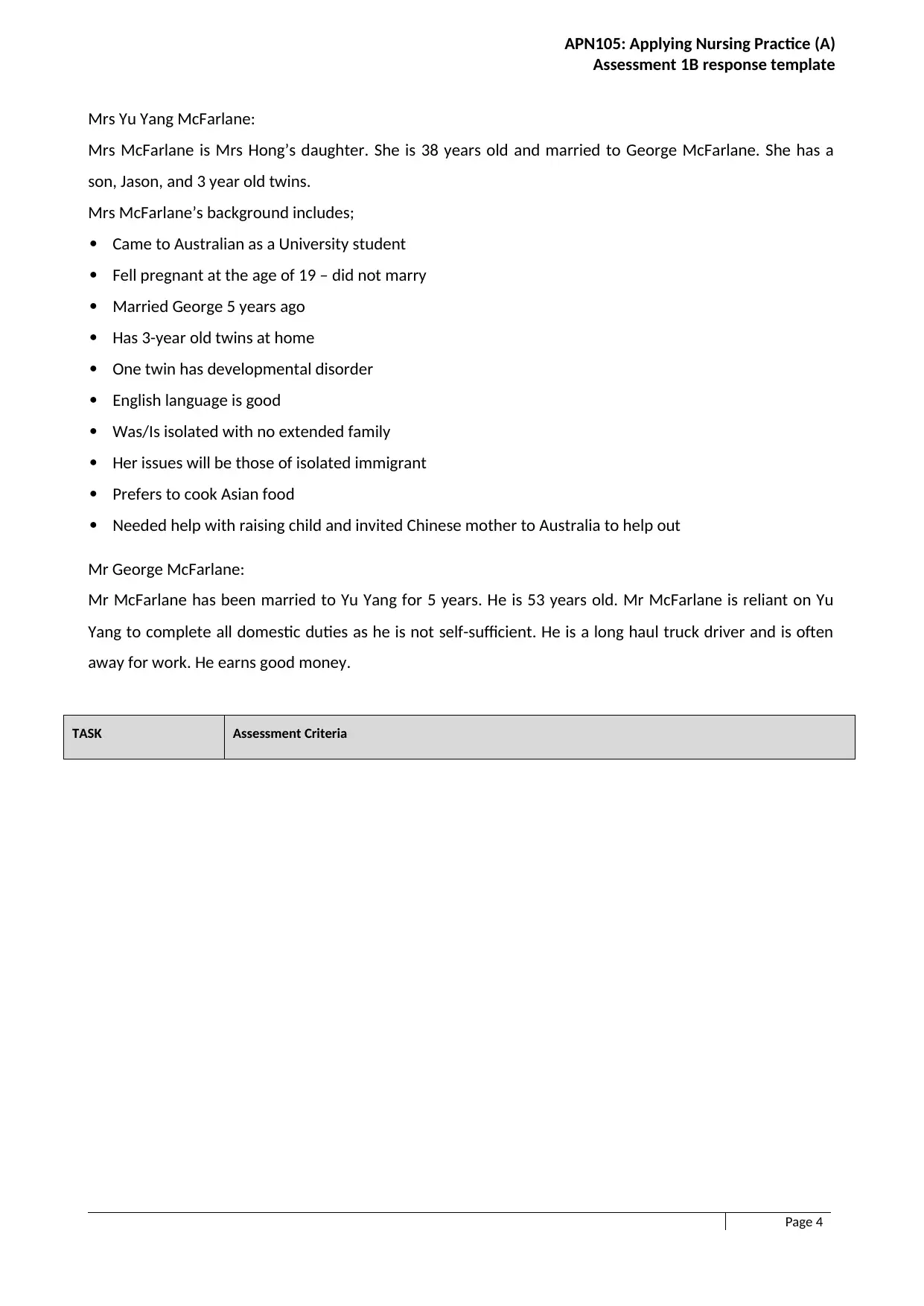
APN105: Applying Nursing Practice (A)
Assessment 1B response template
Mrs Yu Yang McFarlane:
Mrs McFarlane is Mrs Hong’s daughter. She is 38 years old and married to George McFarlane. She has a
son, Jason, and 3 year old twins.
Mrs McFarlane’s background includes;
Came to Australian as a University student
Fell pregnant at the age of 19 – did not marry
Married George 5 years ago
Has 3-year old twins at home
One twin has developmental disorder
English language is good
Was/Is isolated with no extended family
Her issues will be those of isolated immigrant
Prefers to cook Asian food
Needed help with raising child and invited Chinese mother to Australia to help out
Mr George McFarlane:
Mr McFarlane has been married to Yu Yang for 5 years. He is 53 years old. Mr McFarlane is reliant on Yu
Yang to complete all domestic duties as he is not self-sufficient. He is a long haul truck driver and is often
away for work. He earns good money.
TASK Assessment Criteria
Page 4
Assessment 1B response template
Mrs Yu Yang McFarlane:
Mrs McFarlane is Mrs Hong’s daughter. She is 38 years old and married to George McFarlane. She has a
son, Jason, and 3 year old twins.
Mrs McFarlane’s background includes;
Came to Australian as a University student
Fell pregnant at the age of 19 – did not marry
Married George 5 years ago
Has 3-year old twins at home
One twin has developmental disorder
English language is good
Was/Is isolated with no extended family
Her issues will be those of isolated immigrant
Prefers to cook Asian food
Needed help with raising child and invited Chinese mother to Australia to help out
Mr George McFarlane:
Mr McFarlane has been married to Yu Yang for 5 years. He is 53 years old. Mr McFarlane is reliant on Yu
Yang to complete all domestic duties as he is not self-sufficient. He is a long haul truck driver and is often
away for work. He earns good money.
TASK Assessment Criteria
Page 4
Paraphrase This Document
Need a fresh take? Get an instant paraphrase of this document with our AI Paraphraser
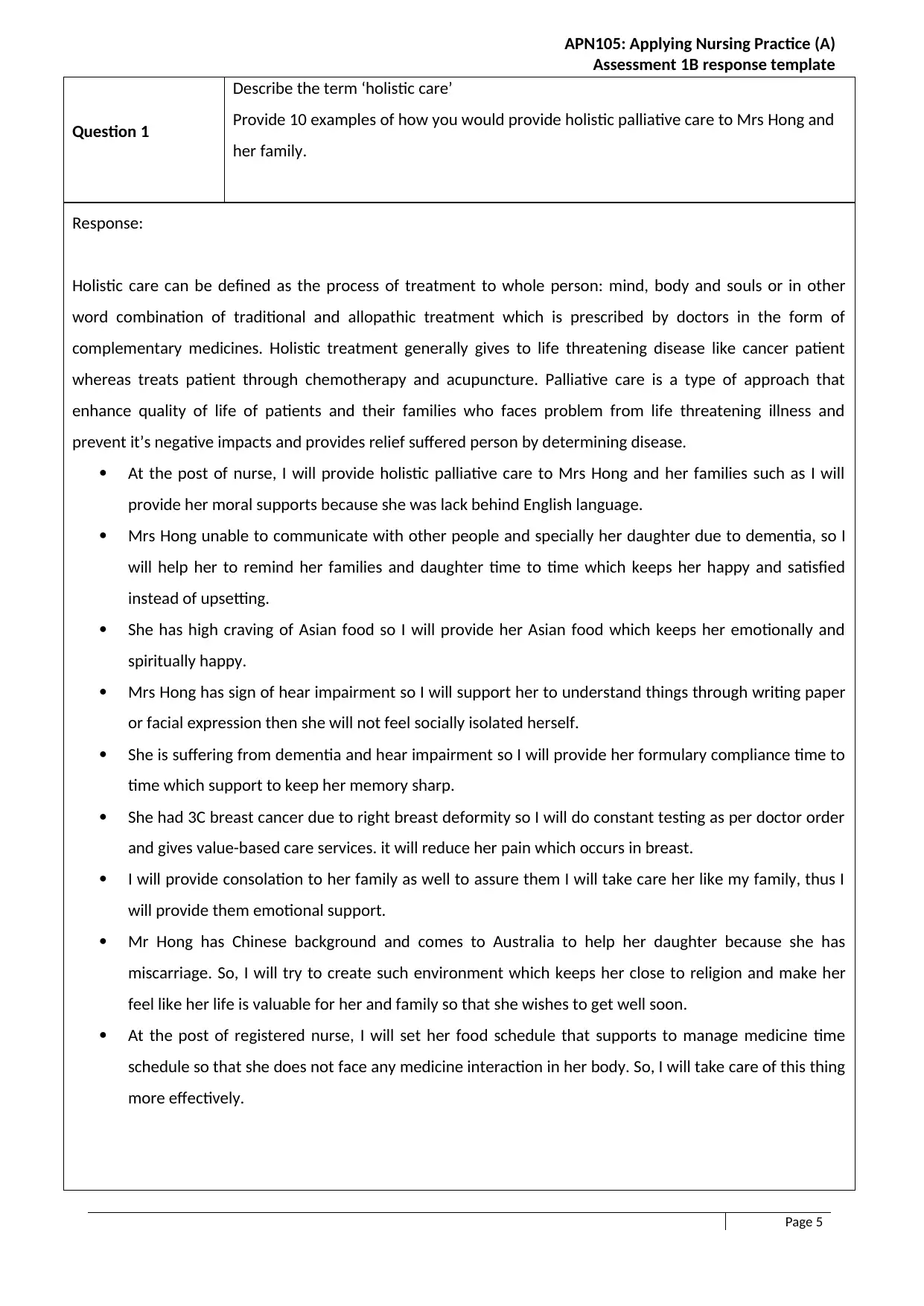
APN105: Applying Nursing Practice (A)
Assessment 1B response template
Question 1
Describe the term ‘holistic care’
Provide 10 examples of how you would provide holistic palliative care to Mrs Hong and
her family.
Response:
Holistic care can be defined as the process of treatment to whole person: mind, body and souls or in other
word combination of traditional and allopathic treatment which is prescribed by doctors in the form of
complementary medicines. Holistic treatment generally gives to life threatening disease like cancer patient
whereas treats patient through chemotherapy and acupuncture. Palliative care is a type of approach that
enhance quality of life of patients and their families who faces problem from life threatening illness and
prevent it’s negative impacts and provides relief suffered person by determining disease.
At the post of nurse, I will provide holistic palliative care to Mrs Hong and her families such as I will
provide her moral supports because she was lack behind English language.
Mrs Hong unable to communicate with other people and specially her daughter due to dementia, so I
will help her to remind her families and daughter time to time which keeps her happy and satisfied
instead of upsetting.
She has high craving of Asian food so I will provide her Asian food which keeps her emotionally and
spiritually happy.
Mrs Hong has sign of hear impairment so I will support her to understand things through writing paper
or facial expression then she will not feel socially isolated herself.
She is suffering from dementia and hear impairment so I will provide her formulary compliance time to
time which support to keep her memory sharp.
She had 3C breast cancer due to right breast deformity so I will do constant testing as per doctor order
and gives value-based care services. it will reduce her pain which occurs in breast.
I will provide consolation to her family as well to assure them I will take care her like my family, thus I
will provide them emotional support.
Mr Hong has Chinese background and comes to Australia to help her daughter because she has
miscarriage. So, I will try to create such environment which keeps her close to religion and make her
feel like her life is valuable for her and family so that she wishes to get well soon.
At the post of registered nurse, I will set her food schedule that supports to manage medicine time
schedule so that she does not face any medicine interaction in her body. So, I will take care of this thing
more effectively.
Page 5
Assessment 1B response template
Question 1
Describe the term ‘holistic care’
Provide 10 examples of how you would provide holistic palliative care to Mrs Hong and
her family.
Response:
Holistic care can be defined as the process of treatment to whole person: mind, body and souls or in other
word combination of traditional and allopathic treatment which is prescribed by doctors in the form of
complementary medicines. Holistic treatment generally gives to life threatening disease like cancer patient
whereas treats patient through chemotherapy and acupuncture. Palliative care is a type of approach that
enhance quality of life of patients and their families who faces problem from life threatening illness and
prevent it’s negative impacts and provides relief suffered person by determining disease.
At the post of nurse, I will provide holistic palliative care to Mrs Hong and her families such as I will
provide her moral supports because she was lack behind English language.
Mrs Hong unable to communicate with other people and specially her daughter due to dementia, so I
will help her to remind her families and daughter time to time which keeps her happy and satisfied
instead of upsetting.
She has high craving of Asian food so I will provide her Asian food which keeps her emotionally and
spiritually happy.
Mrs Hong has sign of hear impairment so I will support her to understand things through writing paper
or facial expression then she will not feel socially isolated herself.
She is suffering from dementia and hear impairment so I will provide her formulary compliance time to
time which support to keep her memory sharp.
She had 3C breast cancer due to right breast deformity so I will do constant testing as per doctor order
and gives value-based care services. it will reduce her pain which occurs in breast.
I will provide consolation to her family as well to assure them I will take care her like my family, thus I
will provide them emotional support.
Mr Hong has Chinese background and comes to Australia to help her daughter because she has
miscarriage. So, I will try to create such environment which keeps her close to religion and make her
feel like her life is valuable for her and family so that she wishes to get well soon.
At the post of registered nurse, I will set her food schedule that supports to manage medicine time
schedule so that she does not face any medicine interaction in her body. So, I will take care of this thing
more effectively.
Page 5
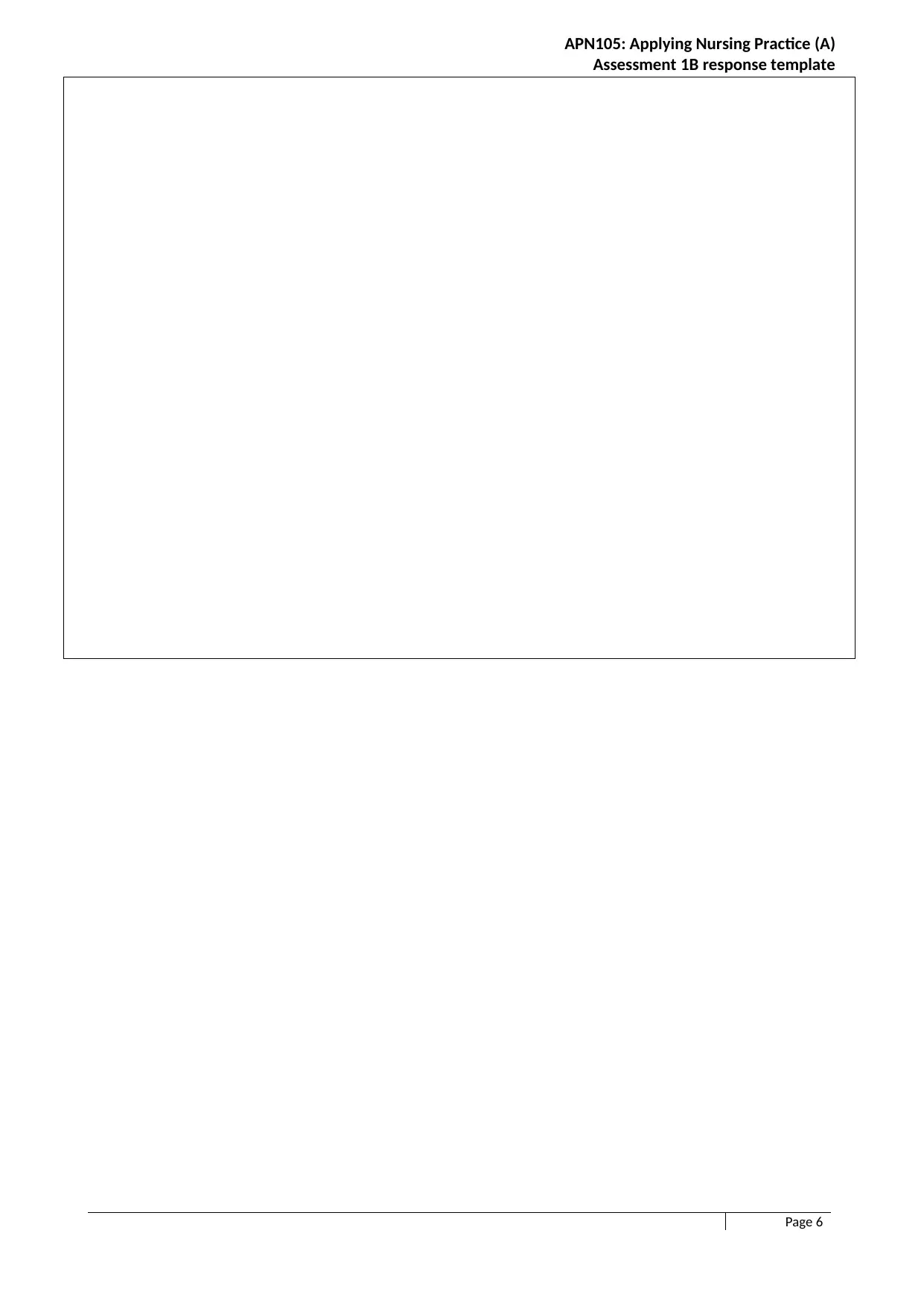
APN105: Applying Nursing Practice (A)
Assessment 1B response template
Page 6
Assessment 1B response template
Page 6
⊘ This is a preview!⊘
Do you want full access?
Subscribe today to unlock all pages.

Trusted by 1+ million students worldwide
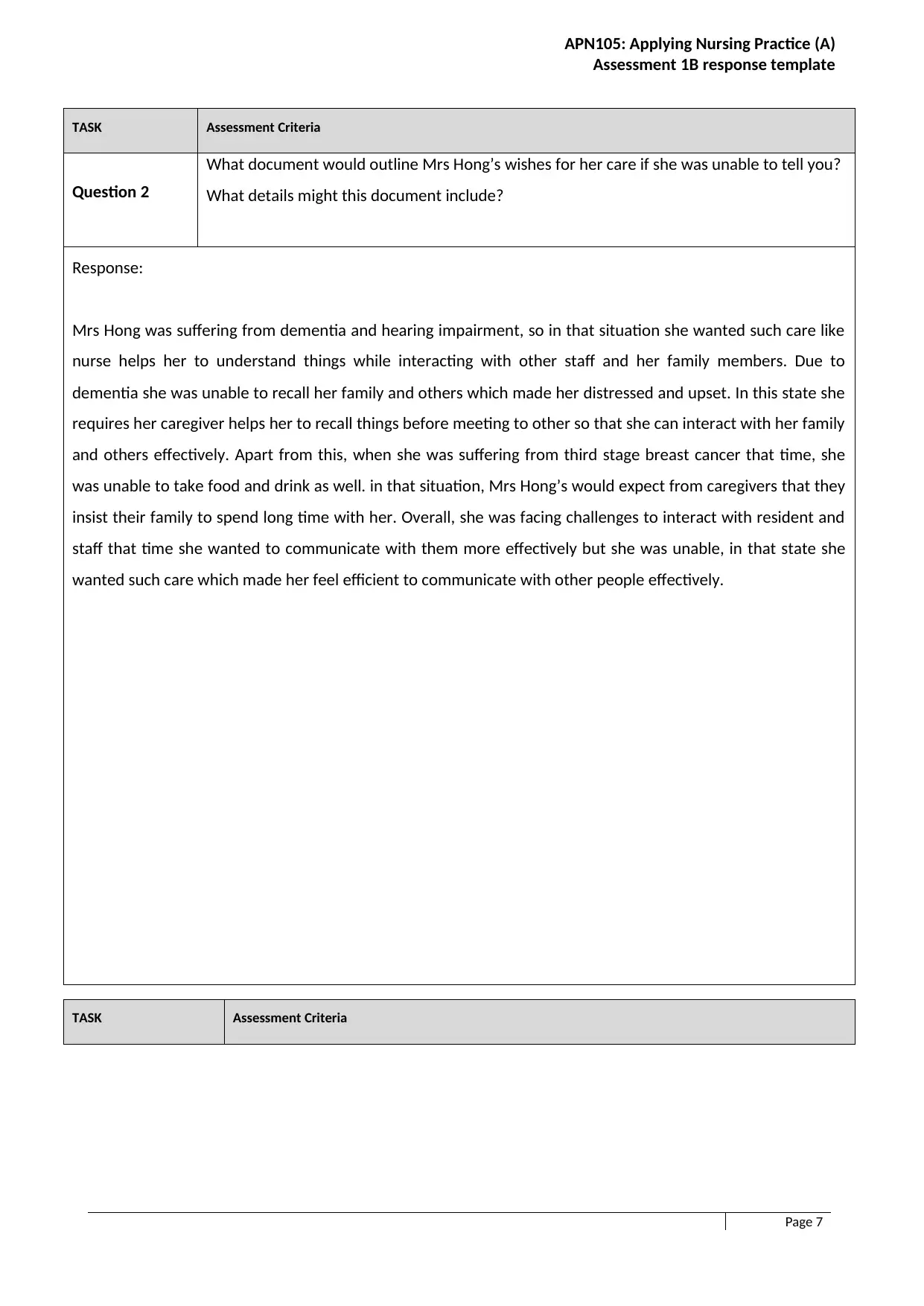
APN105: Applying Nursing Practice (A)
Assessment 1B response template
TASK Assessment Criteria
Question 2
What document would outline Mrs Hong’s wishes for her care if she was unable to tell you?
What details might this document include?
Response:
Mrs Hong was suffering from dementia and hearing impairment, so in that situation she wanted such care like
nurse helps her to understand things while interacting with other staff and her family members. Due to
dementia she was unable to recall her family and others which made her distressed and upset. In this state she
requires her caregiver helps her to recall things before meeting to other so that she can interact with her family
and others effectively. Apart from this, when she was suffering from third stage breast cancer that time, she
was unable to take food and drink as well. in that situation, Mrs Hong’s would expect from caregivers that they
insist their family to spend long time with her. Overall, she was facing challenges to interact with resident and
staff that time she wanted to communicate with them more effectively but she was unable, in that state she
wanted such care which made her feel efficient to communicate with other people effectively.
TASK Assessment Criteria
Page 7
Assessment 1B response template
TASK Assessment Criteria
Question 2
What document would outline Mrs Hong’s wishes for her care if she was unable to tell you?
What details might this document include?
Response:
Mrs Hong was suffering from dementia and hearing impairment, so in that situation she wanted such care like
nurse helps her to understand things while interacting with other staff and her family members. Due to
dementia she was unable to recall her family and others which made her distressed and upset. In this state she
requires her caregiver helps her to recall things before meeting to other so that she can interact with her family
and others effectively. Apart from this, when she was suffering from third stage breast cancer that time, she
was unable to take food and drink as well. in that situation, Mrs Hong’s would expect from caregivers that they
insist their family to spend long time with her. Overall, she was facing challenges to interact with resident and
staff that time she wanted to communicate with them more effectively but she was unable, in that state she
wanted such care which made her feel efficient to communicate with other people effectively.
TASK Assessment Criteria
Page 7
Paraphrase This Document
Need a fresh take? Get an instant paraphrase of this document with our AI Paraphraser
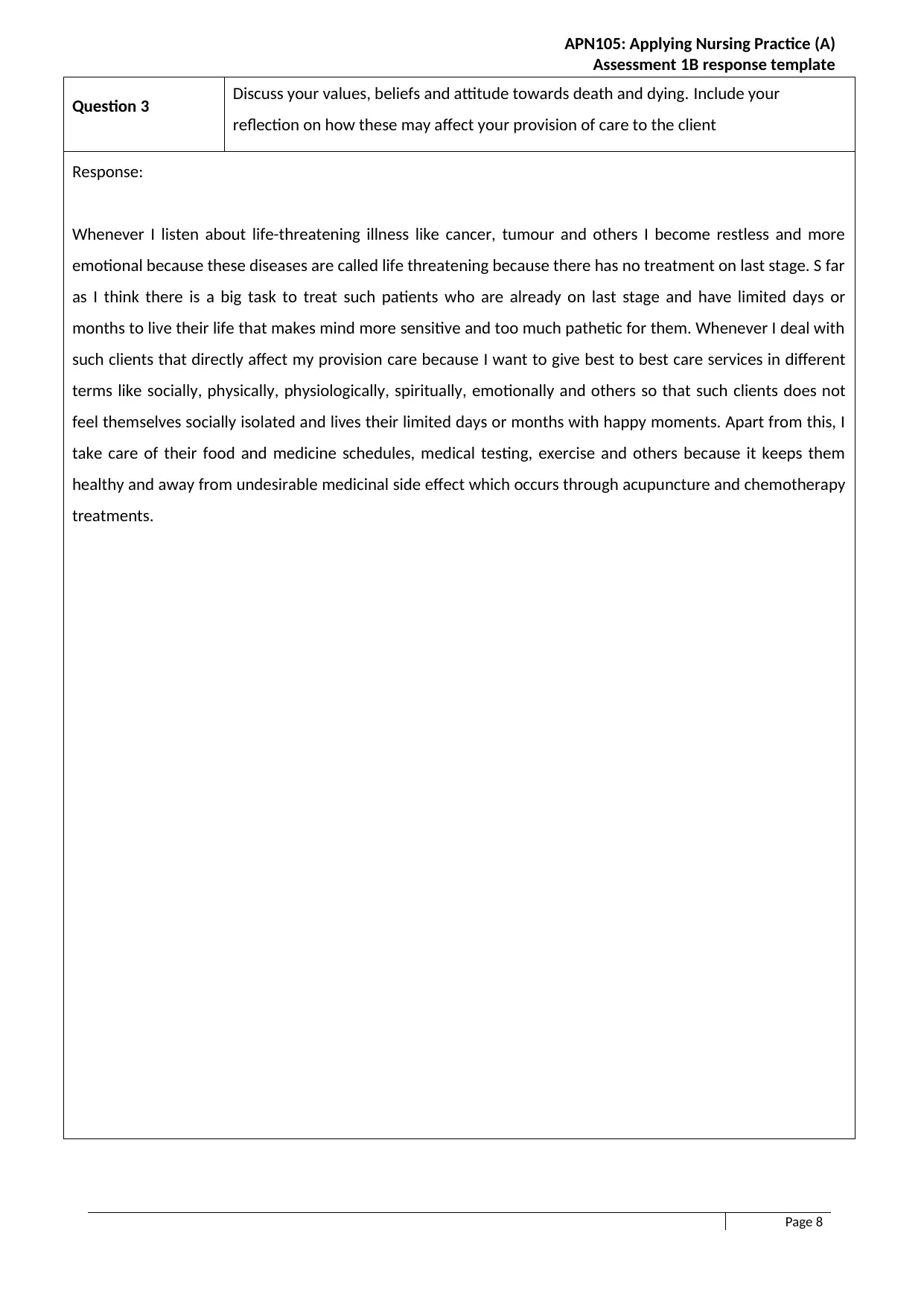
APN105: Applying Nursing Practice (A)
Assessment 1B response template
Question 3 Discuss your values, beliefs and attitude towards death and dying. Include your
reflection on how these may affect your provision of care to the client
Response:
Whenever I listen about life-threatening illness like cancer, tumour and others I become restless and more
emotional because these diseases are called life threatening because there has no treatment on last stage. S far
as I think there is a big task to treat such patients who are already on last stage and have limited days or
months to live their life that makes mind more sensitive and too much pathetic for them. Whenever I deal with
such clients that directly affect my provision care because I want to give best to best care services in different
terms like socially, physically, physiologically, spiritually, emotionally and others so that such clients does not
feel themselves socially isolated and lives their limited days or months with happy moments. Apart from this, I
take care of their food and medicine schedules, medical testing, exercise and others because it keeps them
healthy and away from undesirable medicinal side effect which occurs through acupuncture and chemotherapy
treatments.
Page 8
Assessment 1B response template
Question 3 Discuss your values, beliefs and attitude towards death and dying. Include your
reflection on how these may affect your provision of care to the client
Response:
Whenever I listen about life-threatening illness like cancer, tumour and others I become restless and more
emotional because these diseases are called life threatening because there has no treatment on last stage. S far
as I think there is a big task to treat such patients who are already on last stage and have limited days or
months to live their life that makes mind more sensitive and too much pathetic for them. Whenever I deal with
such clients that directly affect my provision care because I want to give best to best care services in different
terms like socially, physically, physiologically, spiritually, emotionally and others so that such clients does not
feel themselves socially isolated and lives their limited days or months with happy moments. Apart from this, I
take care of their food and medicine schedules, medical testing, exercise and others because it keeps them
healthy and away from undesirable medicinal side effect which occurs through acupuncture and chemotherapy
treatments.
Page 8
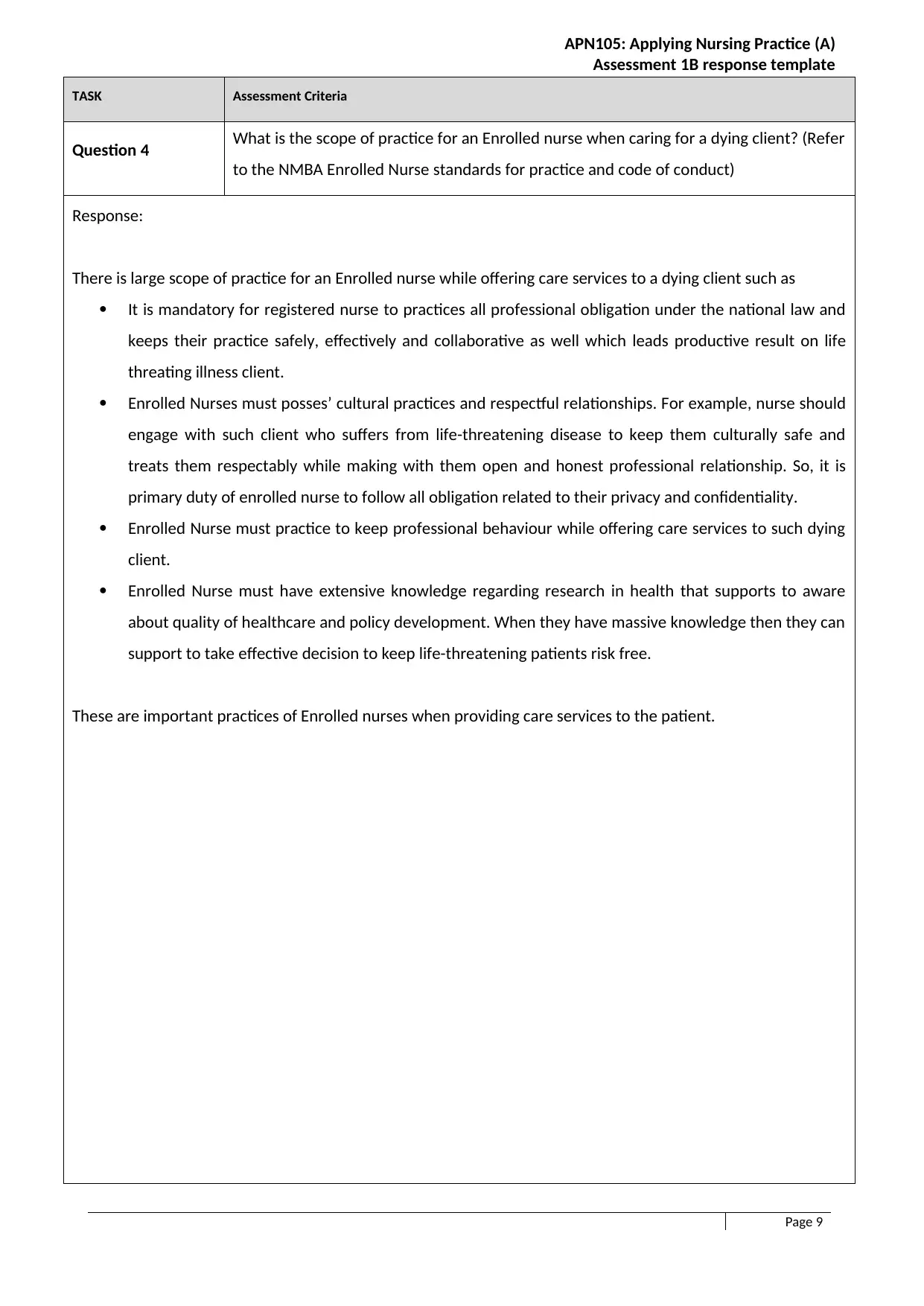
APN105: Applying Nursing Practice (A)
Assessment 1B response template
TASK Assessment Criteria
Question 4 What is the scope of practice for an Enrolled nurse when caring for a dying client? (Refer
to the NMBA Enrolled Nurse standards for practice and code of conduct)
Response:
There is large scope of practice for an Enrolled nurse while offering care services to a dying client such as
It is mandatory for registered nurse to practices all professional obligation under the national law and
keeps their practice safely, effectively and collaborative as well which leads productive result on life
threating illness client.
Enrolled Nurses must posses’ cultural practices and respectful relationships. For example, nurse should
engage with such client who suffers from life-threatening disease to keep them culturally safe and
treats them respectably while making with them open and honest professional relationship. So, it is
primary duty of enrolled nurse to follow all obligation related to their privacy and confidentiality.
Enrolled Nurse must practice to keep professional behaviour while offering care services to such dying
client.
Enrolled Nurse must have extensive knowledge regarding research in health that supports to aware
about quality of healthcare and policy development. When they have massive knowledge then they can
support to take effective decision to keep life-threatening patients risk free.
These are important practices of Enrolled nurses when providing care services to the patient.
Page 9
Assessment 1B response template
TASK Assessment Criteria
Question 4 What is the scope of practice for an Enrolled nurse when caring for a dying client? (Refer
to the NMBA Enrolled Nurse standards for practice and code of conduct)
Response:
There is large scope of practice for an Enrolled nurse while offering care services to a dying client such as
It is mandatory for registered nurse to practices all professional obligation under the national law and
keeps their practice safely, effectively and collaborative as well which leads productive result on life
threating illness client.
Enrolled Nurses must posses’ cultural practices and respectful relationships. For example, nurse should
engage with such client who suffers from life-threatening disease to keep them culturally safe and
treats them respectably while making with them open and honest professional relationship. So, it is
primary duty of enrolled nurse to follow all obligation related to their privacy and confidentiality.
Enrolled Nurse must practice to keep professional behaviour while offering care services to such dying
client.
Enrolled Nurse must have extensive knowledge regarding research in health that supports to aware
about quality of healthcare and policy development. When they have massive knowledge then they can
support to take effective decision to keep life-threatening patients risk free.
These are important practices of Enrolled nurses when providing care services to the patient.
Page 9
⊘ This is a preview!⊘
Do you want full access?
Subscribe today to unlock all pages.

Trusted by 1+ million students worldwide
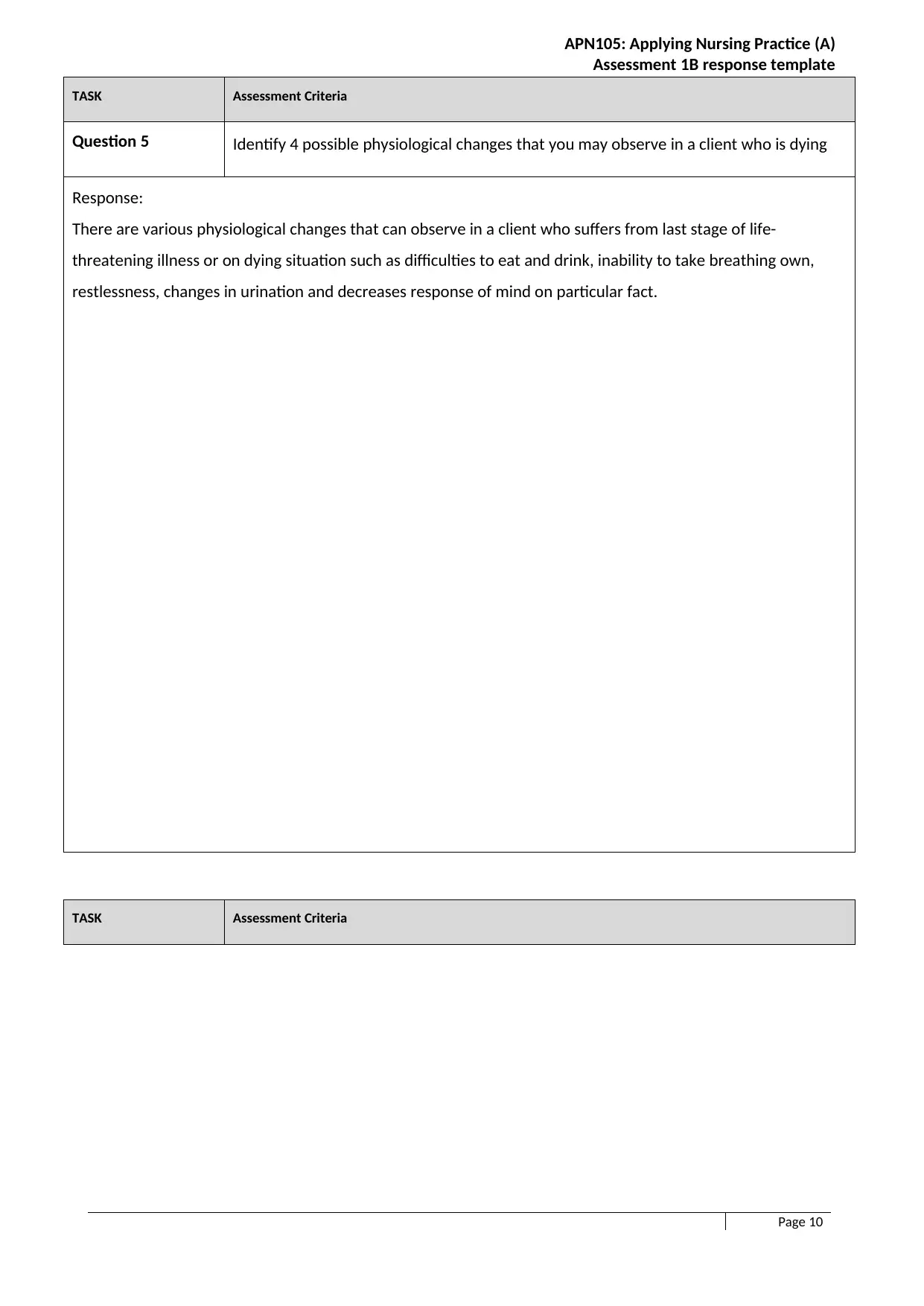
APN105: Applying Nursing Practice (A)
Assessment 1B response template
TASK Assessment Criteria
Question 5 Identify 4 possible physiological changes that you may observe in a client who is dying
Response:
There are various physiological changes that can observe in a client who suffers from last stage of life-
threatening illness or on dying situation such as difficulties to eat and drink, inability to take breathing own,
restlessness, changes in urination and decreases response of mind on particular fact.
TASK Assessment Criteria
Page 10
Assessment 1B response template
TASK Assessment Criteria
Question 5 Identify 4 possible physiological changes that you may observe in a client who is dying
Response:
There are various physiological changes that can observe in a client who suffers from last stage of life-
threatening illness or on dying situation such as difficulties to eat and drink, inability to take breathing own,
restlessness, changes in urination and decreases response of mind on particular fact.
TASK Assessment Criteria
Page 10
Paraphrase This Document
Need a fresh take? Get an instant paraphrase of this document with our AI Paraphraser
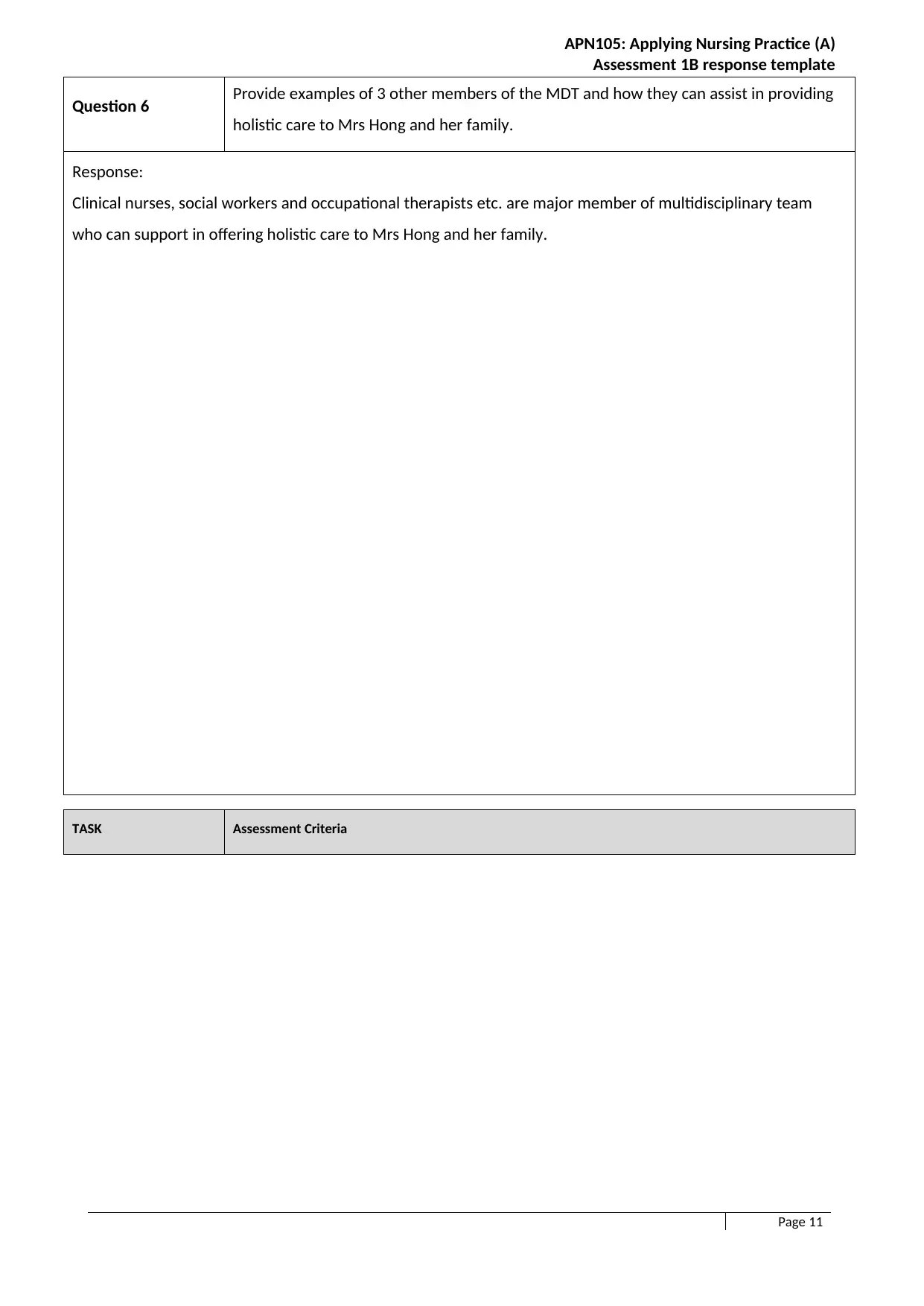
APN105: Applying Nursing Practice (A)
Assessment 1B response template
Question 6 Provide examples of 3 other members of the MDT and how they can assist in providing
holistic care to Mrs Hong and her family.
Response:
Clinical nurses, social workers and occupational therapists etc. are major member of multidisciplinary team
who can support in offering holistic care to Mrs Hong and her family.
TASK Assessment Criteria
Page 11
Assessment 1B response template
Question 6 Provide examples of 3 other members of the MDT and how they can assist in providing
holistic care to Mrs Hong and her family.
Response:
Clinical nurses, social workers and occupational therapists etc. are major member of multidisciplinary team
who can support in offering holistic care to Mrs Hong and her family.
TASK Assessment Criteria
Page 11
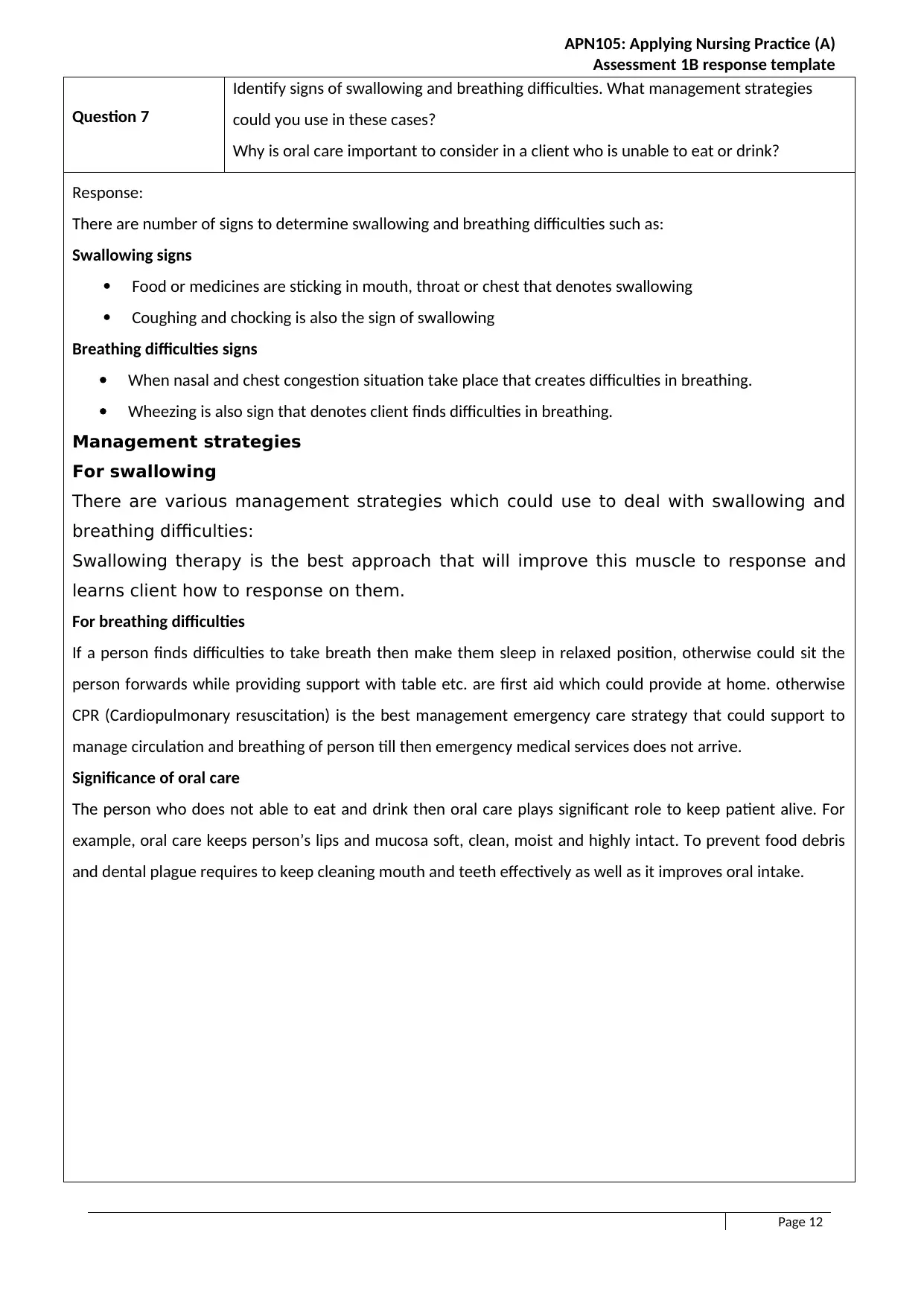
APN105: Applying Nursing Practice (A)
Assessment 1B response template
Question 7
Identify signs of swallowing and breathing difficulties. What management strategies
could you use in these cases?
Why is oral care important to consider in a client who is unable to eat or drink?
Response:
There are number of signs to determine swallowing and breathing difficulties such as:
Swallowing signs
Food or medicines are sticking in mouth, throat or chest that denotes swallowing
Coughing and chocking is also the sign of swallowing
Breathing difficulties signs
When nasal and chest congestion situation take place that creates difficulties in breathing.
Wheezing is also sign that denotes client finds difficulties in breathing.
Management strategies
For swallowing
There are various management strategies which could use to deal with swallowing and
breathing difficulties:
Swallowing therapy is the best approach that will improve this muscle to response and
learns client how to response on them.
For breathing difficulties
If a person finds difficulties to take breath then make them sleep in relaxed position, otherwise could sit the
person forwards while providing support with table etc. are first aid which could provide at home. otherwise
CPR (Cardiopulmonary resuscitation) is the best management emergency care strategy that could support to
manage circulation and breathing of person till then emergency medical services does not arrive.
Significance of oral care
The person who does not able to eat and drink then oral care plays significant role to keep patient alive. For
example, oral care keeps person’s lips and mucosa soft, clean, moist and highly intact. To prevent food debris
and dental plague requires to keep cleaning mouth and teeth effectively as well as it improves oral intake.
Page 12
Assessment 1B response template
Question 7
Identify signs of swallowing and breathing difficulties. What management strategies
could you use in these cases?
Why is oral care important to consider in a client who is unable to eat or drink?
Response:
There are number of signs to determine swallowing and breathing difficulties such as:
Swallowing signs
Food or medicines are sticking in mouth, throat or chest that denotes swallowing
Coughing and chocking is also the sign of swallowing
Breathing difficulties signs
When nasal and chest congestion situation take place that creates difficulties in breathing.
Wheezing is also sign that denotes client finds difficulties in breathing.
Management strategies
For swallowing
There are various management strategies which could use to deal with swallowing and
breathing difficulties:
Swallowing therapy is the best approach that will improve this muscle to response and
learns client how to response on them.
For breathing difficulties
If a person finds difficulties to take breath then make them sleep in relaxed position, otherwise could sit the
person forwards while providing support with table etc. are first aid which could provide at home. otherwise
CPR (Cardiopulmonary resuscitation) is the best management emergency care strategy that could support to
manage circulation and breathing of person till then emergency medical services does not arrive.
Significance of oral care
The person who does not able to eat and drink then oral care plays significant role to keep patient alive. For
example, oral care keeps person’s lips and mucosa soft, clean, moist and highly intact. To prevent food debris
and dental plague requires to keep cleaning mouth and teeth effectively as well as it improves oral intake.
Page 12
⊘ This is a preview!⊘
Do you want full access?
Subscribe today to unlock all pages.

Trusted by 1+ million students worldwide
1 out of 23
Related Documents
Your All-in-One AI-Powered Toolkit for Academic Success.
+13062052269
info@desklib.com
Available 24*7 on WhatsApp / Email
![[object Object]](/_next/static/media/star-bottom.7253800d.svg)
Unlock your academic potential
Copyright © 2020–2026 A2Z Services. All Rights Reserved. Developed and managed by ZUCOL.





